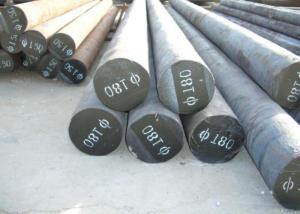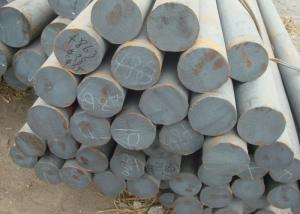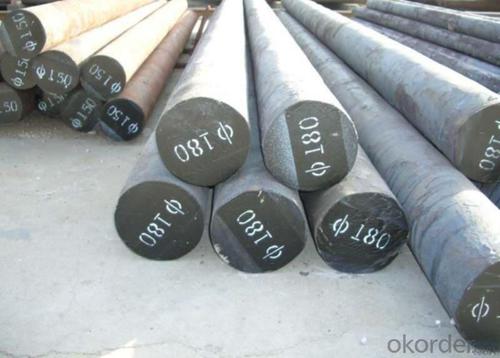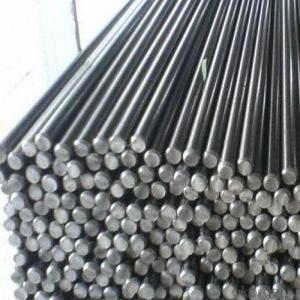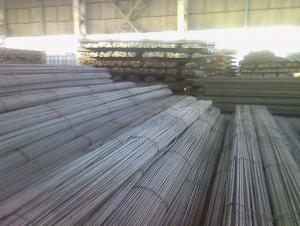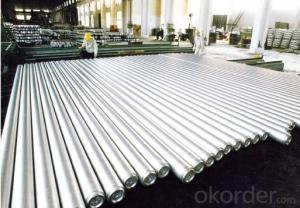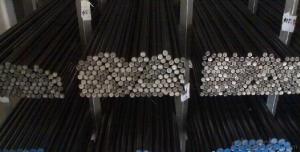Spring Steel 60Si2CrA
- Loading Port:
- China Main Port
- Payment Terms:
- TT or LC
- Min Order Qty:
- 50MT m.t.
- Supply Capability:
- 600000TONS/YEAR m.t./month
OKorder Service Pledge
OKorder Financial Service
You Might Also Like
Spring Steel:
Spring steel is divided into two types, one is alloy spring steel, and other one is carbon spring steel.
Alloy spring steel is a type that is used for manufacturing springs and other elastic parts. Spring steel should have high ratio of yield strength and tensile strength and elastic limit to make sure that the springs obtain enough power of elastic deformation and can bear much load.
Types of alloy spring steel: Si-Mn spring steel, Si-Cr spring steel, Cr-Mn Spring steel, Cr-V spring steel and so on.
Specification of Spring Steel 60Si2CrA
-Material: 60Si2CrA
-Standard: GB/T 1222-1984
-Type: Spring Steel
Corresponding Steel Grade for Reference:
CHN, GB | JPN, JIS | GER, DIN | GBR, BS |
60Si2CrA | SWOSC-V | 67SiCr5 | 685H57 |
USA, AISI/SAE/ASTM | ISO | ||
9254 | 55SiCr63 |
Chemical Composition:
C | Si | Mn | S |
0.52~0.60 | 1.5~2.00 | 0.60~0.90 | ≤0.035 |
P | Cr | Ni | Cu |
≤0.035 | ≤0.35 | ≤0.35 | ≤0.25 |
Mechanical Properties:
-Tensile Strength σb (MPa): ≥1274(130)
-Yield Strength σs (MPa): ≥1176(120)
-Elongation δ10(%): ≥6
-Percentage reduction of area: ψ (%): ≥30
-Hardness:
1, Hot rolled, ≤302HB
2, Cold drawn + Heat treatment: ≤321HB
-Norm of heat treatment: quenching 870℃±20℃
-Micro structure: Tempered troostite.
Usage/Applications of Spring Steel 60Si2CrA
-Compared with Si-Mn spring steel under the similar condition of plasticity, 60Si2CrA have higher tensile strength, yield strength and hardenability.
-60Si2CrA is applied for producing springs with working temperature below 300~500℃. This type of spring can bear high stress, for example, governor spring, turbine steam seal spring, etc…
Packaging & Delivery of Spring Steel 60Si2CrA:
-Packing Detail:
1, The products can be packed in bundles by steel wires.
2, The weight of each bundle no exceed normally 3 tons
-Marks: there are two types of marks. One is tag mark, for showing customers the specifications of products, company name and logo and other information required by customers. Other one is color marks. They are used to make the products more evident so that it’s easy for customers to distinguish them from other products at destination port.
-Delivery Detail: 30~45 working days after receive buyer’s T.T. or L/C.
Transportation:
-The products can be delivered by bulk vessel or by container. As for container, products with the length of 6m will be loaded in 20’ container, with 9m or 12m, in 40’ container.
-The maximum quantity of loading of container is 25 tons.
-The products are usually transported to the nearest port from the production place.
Payment:
-Invoicing on theoretical weight or actual weight as customer’s request.
-FOB, CFR or CIF.
-Terms of payment: T.T. or L/C at sight.
Photos of Spring Steel 60Si2CrA:
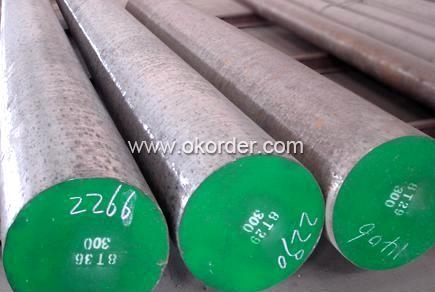
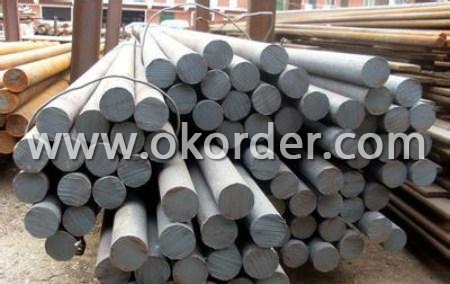
- Q: How is precipitation-hardening steel used in aerospace applications?
- Precipitation-hardening steel is widely used in aerospace applications due to its exceptional strength-to-weight ratio and resistance to corrosion. This type of steel is heat-treated to create a fine dispersion of precipitates, which significantly enhances its mechanical properties. In aerospace, it is commonly used for manufacturing critical components such as landing gear, structural frames, and engine parts. These materials provide the necessary strength and durability required to withstand the demanding conditions of flight while reducing weight to improve fuel efficiency and overall performance.
- Q: What are the different methods of joining special steel?
- There are various techniques available for joining special steel, each presenting its own advantages and limitations. Some of the most frequently employed methods comprise: 1. Welding: The most prevalent technique for joining steel involves melting the base material and incorporating a filler material to establish a robust connection. Depending on the specific requirements, different welding techniques like arc welding, gas welding, and laser welding can be utilized. 2. Brazing: This approach necessitates heating the steel and melting a filler metal with a lower melting point, which then infiltrates the joint through capillary action. Brazing is commonly employed when joining dissimilar metals or when a lower-temperature joining process is indispensable. 3. Soldering: Similar to brazing, soldering also employs a filler material with a lower melting point to join the steel. However, soldering involves melting the filler material without melting the base material. It is often employed for electrical connections and delicate applications. 4. Mechanical fastening: This method entails utilizing mechanical means such as bolts, screws, rivets, or other types of fasteners to join the steel components. Mechanical fastening is frequently favored in situations where disassembly or maintenance is necessary. 5. Adhesive bonding: Special steel can also be joined using adhesives that establish a sturdy bond between the surfaces. Adhesive bonding is suitable for joining intricate shapes, minimizing stress concentrations, and providing exceptional corrosion resistance. 6. Friction welding: This technique involves the application of pressure to rub or spin two steel components together, generating heat that creates a bond. Friction welding is commonly employed for joining high-strength or heat-treated steels. 7. Explosive welding: This method employs explosives to facilitate a high-speed collision between two steel surfaces, resulting in a bond formed in a solid state. Explosive welding is frequently used for joining dissimilar metals or when high strength and corrosion resistance are required. The selection of the appropriate joining method depends on factors such as the type of steel, the desired strength and durability of the joint, the specific application requirements, and the availability of equipment and expertise.
- Q: What are the challenges in casting special steel?
- Some of the challenges in casting special steel include achieving the desired chemical composition and metallurgical properties, ensuring proper fluidity and mold filling, controlling shrinkage and porosity, dealing with high melting temperatures, and managing the presence of alloying elements and impurities. Additionally, the complex and intricate designs of special steel components can pose challenges in achieving accurate and defect-free casting.
- Q: How is corrosion-resistant tool steel used in the production of molds and dies?
- Corrosion-resistant tool steel is used in the production of molds and dies to ensure the longevity and durability of these tools. Since molds and dies are often exposed to harsh environments and corrosive elements, using corrosion-resistant tool steel helps to prevent rust and corrosion, which can lead to premature wear and damage. This type of tool steel also provides excellent strength, hardness, and wear resistance, allowing molds and dies to withstand high-pressure and high-temperature conditions without compromising their performance. Overall, the use of corrosion-resistant tool steel in the production of molds and dies ensures the production of high-quality and long-lasting tools that can withstand the demands of various manufacturing processes.
- Q: How does special steel perform in cryogenic strength?
- The excellent performance of special steel in cryogenic strength is well-known. Cryogenic strength refers to a material's capacity to endure extremely low temperatures while retaining its mechanical properties. Specifically engineered special steels, including stainless steels and nickel-based alloys, exhibit exceptional strength, toughness, and resistance to cracking at cryogenic temperatures. The special steel's distinctive composition and microstructure enable it to maintain its structural integrity and mechanical properties even under extremely cold conditions. These materials are designed to endure thermal stresses and brittleness that may occur at cryogenic temperatures, ensuring their reliability and performance in various applications. The critical importance of special steel's ability to excel in cryogenic strength is evident in industries such as aerospace, energy, and gas processing, where components are exposed to extremely low temperatures. For instance, the aerospace industry utilizes special steel in the construction of cryogenic fuel tanks and rocket engines, where it must withstand the extreme cold of space. Moreover, special steel's cryogenic strength proves advantageous in applications like liquefied natural gas (LNG) storage and transportation. The low temperatures involved in LNG processes necessitate materials that can endure thermal stresses while maintaining their strength and toughness. To summarize, special steel's unique composition and microstructure contribute to its exceptional performance in cryogenic strength. Its ability to endure extremely low temperatures without sacrificing mechanical properties makes it a reliable choice for applications in industries where cryogenic conditions are prevalent.
- Q: What are the different methods of surface carburizing for special steel?
- Surface carburizing is a heat treatment process used to increase the carbon content at the surface of steel, resulting in a hardened outer layer. There are several methods of surface carburizing for special steel, each with its own advantages and disadvantages. 1. Gas Carburizing: This method involves exposing the steel to a carbon-rich gas, such as methane or propane, at elevated temperatures. The gas reacts with the steel surface, depositing carbon and forming a hardened layer. Gas carburizing is a widely used method due to its versatility, controllability, and ability to produce uniform and deep case depths. However, it requires specialized equipment and longer processing times. 2. Pack Carburizing: In this method, the steel is packed in a container with a carbon-rich material, such as charcoal or carbon powder. The container is then heated to high temperatures, allowing carbon to diffuse into the steel surface. Pack carburizing is a cost-effective method, but it is relatively slower and less controllable compared to gas carburizing. 3. Liquid Carburizing: Also known as cyaniding, this method involves immersing the steel in a liquid bath containing a carbon-rich compound, such as sodium cyanide. The bath is heated to high temperatures, which enables carbon diffusion into the surface of the steel. Liquid carburizing is a fast and cost-effective method, but it requires careful handling of toxic chemicals and may result in lower case depths compared to other methods. 4. Plasma Carburizing: This method utilizes a plasma discharge to provide a carbon-rich atmosphere around the steel surface. The plasma contains hydrocarbons, which dissociate into carbon atoms that diffuse into the steel. Plasma carburizing offers precise control over case depth and can achieve high surface hardness. However, it requires specialized equipment and is generally more expensive than other methods. 5. Salt Bath Carburizing: In this method, the steel is immersed in a molten salt bath containing carbon-rich compounds. The salt bath is heated to high temperatures, allowing carbon to diffuse into the steel surface. Salt bath carburizing is a versatile method that can achieve high case depths and excellent surface hardness. However, it requires careful temperature control and can be challenging to remove the salt residues after the process. It is important to select the appropriate method of surface carburizing based on the specific requirements of the special steel, such as desired case depth, hardness, and cost considerations.
- Q: What are the limitations of using special steel in high-stress applications?
- There are several limitations to using special steel in high-stress applications. Firstly, special steel can be expensive compared to other materials, making it less economical for certain projects. Additionally, special steel may not possess the necessary resistance to corrosion or other environmental factors, which can limit its durability in certain conditions. Moreover, special steel may have specific temperature limitations, as it can lose strength at extreme heat or cold. Finally, the availability of certain special steel grades may be limited, making it challenging to source the required material for high-stress applications.
- Q: How does electrical steel contribute to the production of transformers and motors?
- Electrical steel, also known as silicon steel, plays a crucial role in the production of transformers and motors. Its unique magnetic properties, achieved through the addition of silicon, allow for efficient energy transfer and reduction of energy losses. The low core loss and high magnetic permeability of electrical steel enable transformers to convert high voltage electricity into lower voltage levels, and motors to efficiently convert electrical energy into mechanical motion. In essence, electrical steel is the essential material that enables the high efficiency and performance of transformers and motors, making them indispensable components in various electrical applications.
- Q: What are the different methods of analyzing the microstructure of special steel?
- There are several methods available for analyzing the microstructure of special steel. These methods involve the examination and characterization of the steel at a microscopic level to understand its composition, grain structure, and other features. Some of the commonly used methods include: 1. Optical Microscopy: This method involves the use of light microscopy to observe the microstructure of special steel. It allows for the identification of different phases, grain boundaries, inclusions, and other features. Optical microscopy provides valuable information about the size, distribution, and morphology of different constituents in the steel. 2. Scanning Electron Microscopy (SEM): SEM is a powerful technique that uses a high-energy electron beam to analyze the microstructure of special steel. It provides detailed information about the surface topography, morphology, and elemental composition of the steel. SEM is particularly useful for studying the presence of precipitates, segregation, and other microstructural defects. 3. Transmission Electron Microscopy (TEM): TEM is an advanced technique that allows for the analysis of the microstructure at a much higher resolution compared to optical and SEM methods. It involves the transmission of electrons through a thin sample, which provides information about the crystal structure, dislocations, and other fine details of the microstructure. TEM is especially useful for studying the nanostructures and interfaces in special steel. 4. X-ray Diffraction (XRD): XRD is a non-destructive method that uses X-rays to analyze the crystal structure and phase identification of special steel. It provides information about the crystallographic orientation, grain size, and phase composition of the steel. XRD is widely used for analyzing the phase transformations and residual stress in special steel. 5. Electron Backscatter Diffraction (EBSD): EBSD is a technique that combines SEM with crystallographic analysis. It provides information about the crystal orientation, texture, and grain boundaries in special steel. EBSD is useful for studying the deformation mechanisms, recrystallization, and grain growth in the steel. 6. Energy Dispersive X-ray Spectroscopy (EDS): EDS is a technique that is often used in conjunction with SEM or TEM to analyze the elemental composition of special steel. It provides information about the presence and distribution of different chemical elements in the microstructure, allowing for the identification of phases and the characterization of inclusions. These methods, along with others, provide valuable insights into the microstructure of special steel, enabling researchers and engineers to understand its properties, performance, and potential applications.
- Q: How does mold steel resist wear and erosion?
- Mold steel resists wear and erosion due to its high hardness, toughness, and resistance to deformation. It has a fine microstructure that allows it to withstand the repetitive stresses and strains associated with molding processes. Additionally, certain alloying elements like chromium and molybdenum enhance its corrosion resistance, making it more durable against wear and erosion caused by environmental factors.
1. Manufacturer Overview
| Location | Jiangsu, China |
| Year Established | 1990 |
| Annual Output Value | Above US$ 20 Million |
| Main Markets | Mid East; Eastern Europe; North America |
| Company Certifications |
2. Manufacturer Certificates
| a) Certification Name | |
| Range | |
| Reference | |
| Validity Period |
3. Manufacturer Capability
| a) Trade Capacity | |
| Nearest Port | Shanghai |
| Export Percentage | 20% - 30% |
| No.of Employees in Trade Department | 21-50 People |
| Language Spoken: | English; Chinese |
| b) Factory Information | |
| Factory Size: | Above 100,000 square meters |
| No. of Production Lines | 1 |
| Contract Manufacturing | OEM Service Offered; |
| Product Price Range | High; Average |
Send your message to us
Spring Steel 60Si2CrA
- Loading Port:
- China Main Port
- Payment Terms:
- TT or LC
- Min Order Qty:
- 50MT m.t.
- Supply Capability:
- 600000TONS/YEAR m.t./month
OKorder Service Pledge
OKorder Financial Service
Similar products
Hot products
Hot Searches
Related keywords
